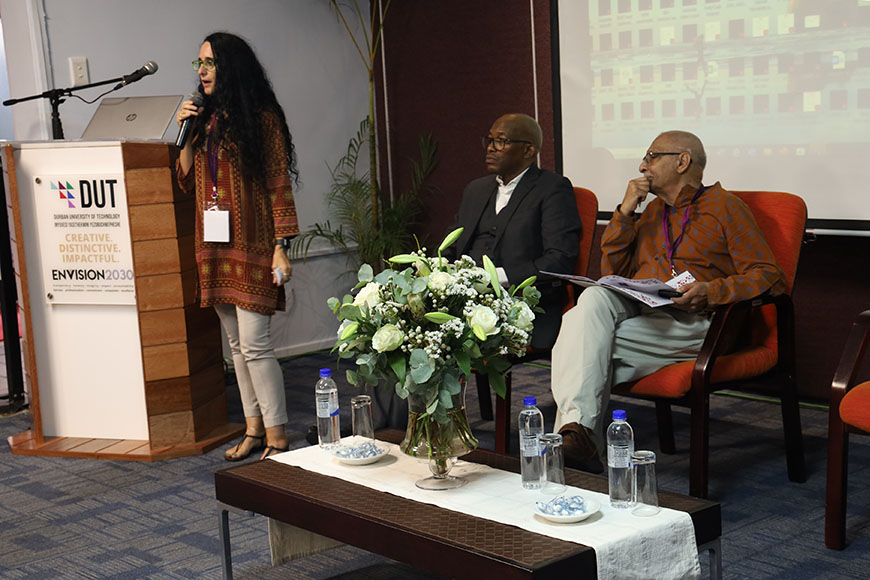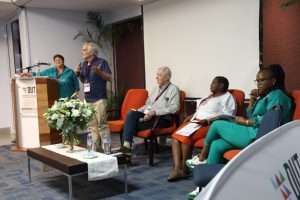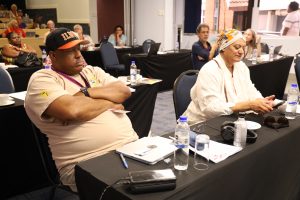The Durban University of Technology (DUT) in collaboration with the South African History Online (SAHO) hosted the 1973 Durban Strikes-Celebrating 50 Years Conference at the DUT Hotel School Conference Centre, Ritson Campus, Durban. This conference which attracted several prominent historians and labour studies experts from major international and South African universities was held over three days, commencing on Thursday, 26 January 2023 to Saturday, 28 January 2023.
Amongst the esteemed guests gracing the event was the Minister of Higher Education, Science and Innovation, Dr Blade Nzimande who also engaged in the discussion after a panel presentation entitled ‘The 1973 Durban Strikes: Rethinking the Politics of the Time’ which featured trade unionists and labour scholars who have been prominent through the decades from the time of the strikes.
Chairing the opening session was Professor Monique Marks, Director: Urban Futures Centre at DUT, who was part of the organising committee. She indicated that the excitement behind the conference is the coming together of people who know one another both personally and through the activities that they have historically done and continue to do in the present. According to Prof Marks, this was a congregation of friends, colleagues and comrades.
“It is great to see familiar faces meeting each other, just remembering backwards for forward,” she said.
In his welcome address, the DUT Vice-Chancellor and Principal, Professor Thandwa Mthembu began by acknowledging a number of prominent individuals present including, Alec Erwin, former Minister of Trade and Enterprise and Nomarashiya Caluza, Provincial Secretary of South African Trade Teachers Union (SADTU) KZN. He also acknowledged the organising committee consisting of Prof Omar Badsha from SAHO, Prof Ari Sitas from the University of Cape Town (UCT), Prof Debby Bonnin from the University of Pretoria, Prof Nicole Ulrich from University of Fort Hare, Prof Eddie Webster from Wits, Prof Noor Nieftagodien also from Wits and DUT’s Prof Marks and her team from the Urban Futures Centre for their dedication in hosting this historical event.
“Curries Fountain is the epicentre of the 1973 Durban Strikes and Durban University of Technology. Curries Fountain is adjoined to the DUT City Camps and remains a constant reminder to DUT and everyone else that brought freedom to labourers. It is not surprising then that this symposium should take place at DUT, where Curries Fountain sits,” said Prof Mthembu.
He indicated that the conference had two key objects, the first was to commemorate, celebrate the 1973 Durban Strikes and the second was to reflect on where the labour movement is and what needs to be done going forward. Prof Mthembu further indicated that the first objective was critical as history defines where South Africa is presently and provides a guide for the future. He added that the second objective is equally important as the South Africa now is different from that of the 1970s. In addition, Prof Mthembu said the Durban Strikes played a key role in laying foundations in the Labour Relations Act which recognises the rights of workers and sets out mechanisms for resolving labour disputes.
Speaking on the significance of the conference was the organising committee leader, Omar Badsha of South African History Online. He said: “This area had the largest number of the Communist Party members. This area is very rich at history. South African History Online, for the last couple of years have been trying to win the support of the academic community and have succeeded. Over the years, we have been having a series of conferences and research projects. One of the things we initiated was to get the students involved in oral history, putting together archival material and housing it in the city. All the people I approached at DUT were fascinated by the idea and offered to assist in getting students involved in this project.” In addition, Badsha thanked the organising committee for working around the clock in making the event a success.
Besides the different sessions held throughout the conference made out of panellists speaking on trade unions and issues affecting workers, there were cultural events linked to the conference. At the conference venue there was an exhibition on display titled: 1973: Strike Against Cheap Labour curated by David Hemson. The exhibition covered themes such as Wages Commissions, Harriet Bolton and Bolton Hall, Barney Dladla various Workers Posters, the 1972 Dock Strike and the 1974 follow-on strike. Similar exhibitions were also held at the BAT Centre and KwaMuhle Museum.
Opening the discussions at the conference was a panel made out of the esteemed labour activists such as Diane Cooper, David Hemson, Alec Erwin, Nomonde Mgumane and Nomarashiya Caluza. They held an intergenerational discussion on trade unions during their time.
Other topics discussed on Day 1 by the esteemed guests speakers in attendance included: The 1973 Durban Strikes: Rethinking the Politics of the Time, The 1973 Durban Strikes and Its Legacy, Students and Intellectuals in Workers’ Struggles. Day 1 ended on a high note with a conference dinner and three book launched. The three books launched are: The Durban Strikes: Human Being with Souls (with a new introduction) by Gerhard Mare. The second book was Organise and Act. The Natal Workers Theatre Movement 1983-1987 (with a new introduction) by Astrid von Kotze. Peter Cole launched the third book titled: Dockworker Power. Race and Activism in Durban and the San Francisco Bay Area.
Day 2 was just as exciting as the opening day filled with talks from labour experts and activists. The discussions were on Trade Unions and Popular Politics, Trade Unions, Power and Policy, Workers Education, Artefacts of Working Class Struggle and the Workers Cultural Movements. Making the Day 2 much more interesting was the evening session where the guests were treated to a musical performance called: The Story of A Strike directed by UCT’s Prof Ari Sitas. It was held at the DUT Courtyard Theatre. The musical told the story of the strikes, but also the stories of the people who decided that in January and February 1973 to say “enough is enough” and ignited the road to freedom.
The closing discussions on Day 3 were centred on the following topics: Histories of Work, Struggle and Everyday Life, Changing Forms of Work, Changing Organisations, The New Working Class, The Precariat and Trade. There was also a review of the South African Trade Unions and discussions on the Trade Unions and Visions of the future. The conference ended with deliberations about what the trade union movement should be doing now in a political economy that has rendered most South Africans as precarious, casual, and informal workers. It was also noted that there needs to be deliberations about what is meant by the notions of ‘meaningful work’, ‘labour’, and what Prof Marks coins ‘the burden of the future.’ Also important to follow through is a conversation about where engaged scholarship is likely to emerge and be sustained in the future, aligning with DUT’s commitment to society and to stewardship.
Pictured: Prof Monique Marks, Director: Urban Futures Centre at DUT addressing the guests, seated is the DUT Vice-Chancellor and Principal, Prof Thandwa Mthembu and Prof Omar Badsha from the South African History Online.
Photographer: Nomvelo Zulu
Simangele Zuma



